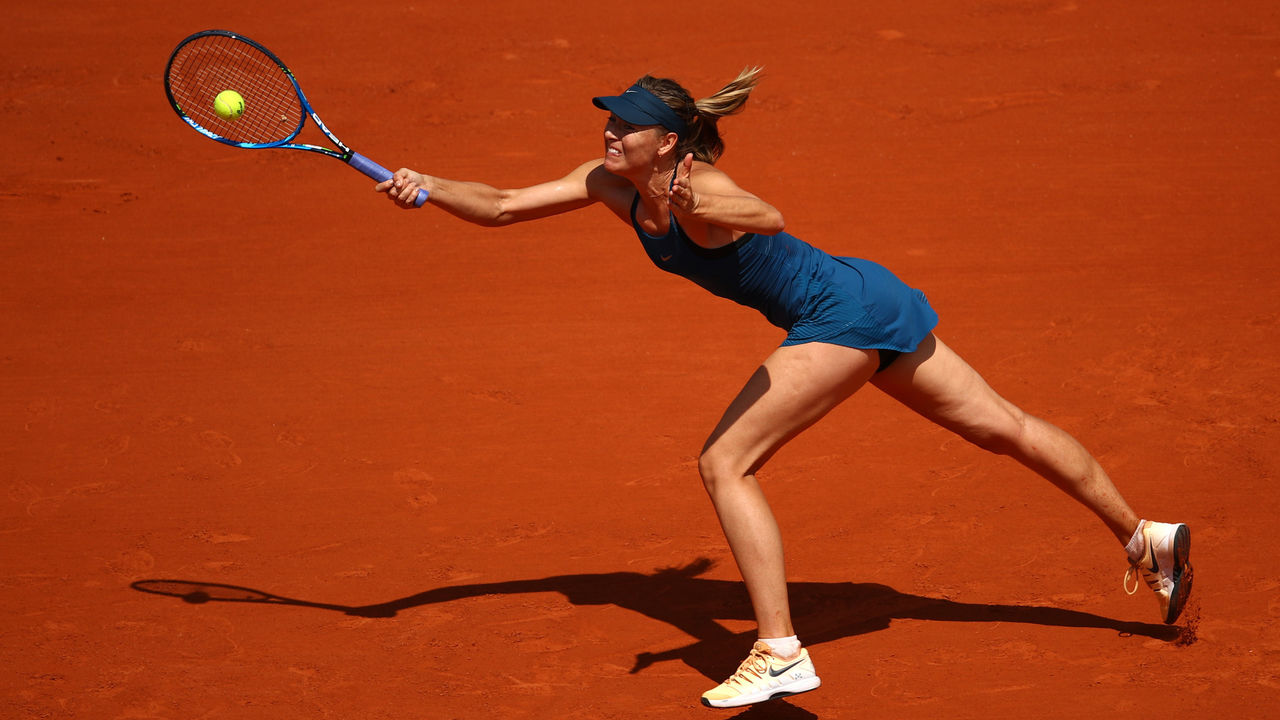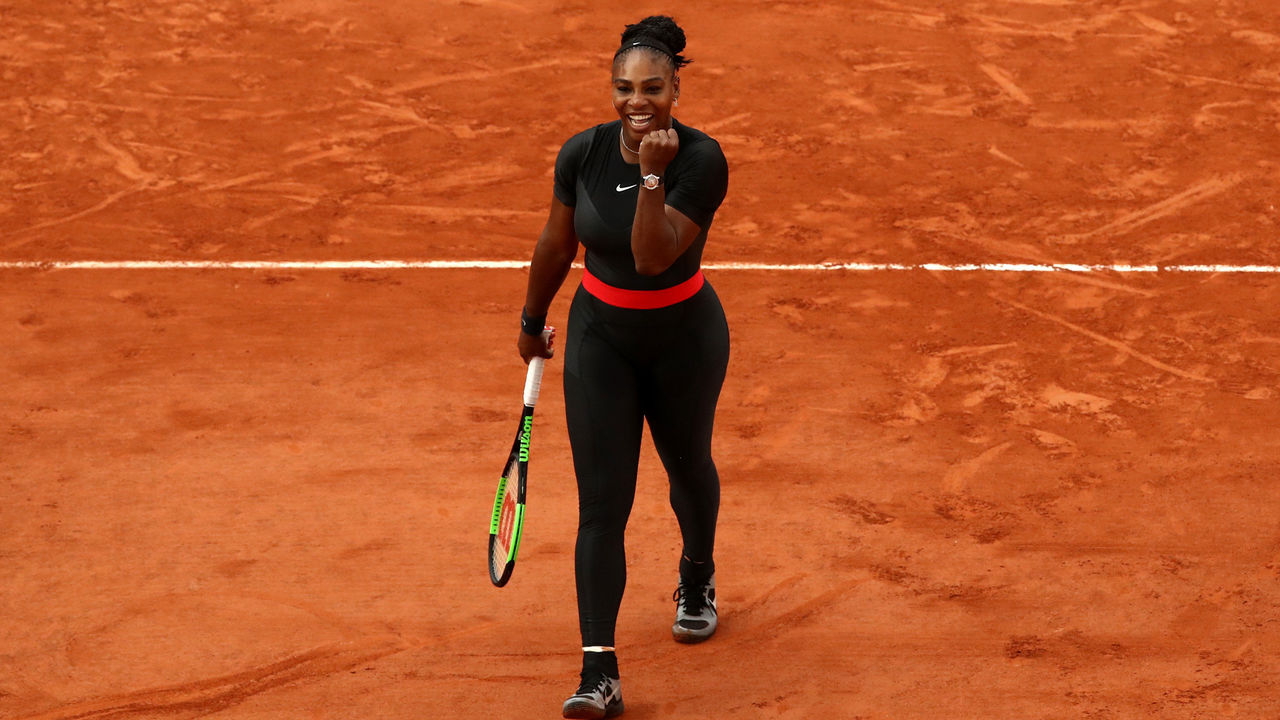Can Maria Sharapova finally beat Serena Williams?
Well, well, well.
Maria Sharapova and Serena Williams both took care of business at Roland Garros on Saturday, winning their respective third-round matches in decisive fashion to set up an enticing Round of 16 clash that many have been anticipating since the draw was announced.
Williams and Sharapova have collectively dominated the French Open in recent history; both are multiple champions who have collectively won four of the last six titles at this tournament, with another two runner-up finishes during that time. And that's with both players missing last year's edition. When it comes to pedigree and star power, fourth-round matches don't get any bigger than this.
The question is, will it be competitive? Is the outcome even in doubt? History suggests not. Sharapova was 17 the last time she won a match in this head-to-head. Since the 2004 Wimbledon final, Serena has beaten her 18 straight times, and the disparity has only grown more lopsided over time. Serena has won each of the last 16 sets the two have played, and 28 of the last 29. That's 14 matches, dating back to 2008, in which Sharapova has won a total of one set. Yeesh.
For all that, there's still reason to believe this time could be different, that Sharapova might finally succeed in the Sisyphean endeavor to topple her longtime tormentor. For as much as she seems to be playing her way into form, Serena is still shaking off rust and regaining her fitness after her year-long layoff, her pregnancy, and her health scare after childbirth. Clay is her weakest surface, and Sharapova's strongest. Even Serena conceded that this match is not like the others.
"Quite frankly, I think she's probably a favorite in this match," Serena said after her third-round win. "She's been playing for over a year now, I just started. So, I'm just really trying to get my bearings and feel out where I am and see where I can go."

Sharapova has been trying to regain her own form since returning from a 15-month doping suspension last April, with myriad injuries interrupting her progress and momentum along the way, but she's been playing out of her mind in Paris this week. Exhibit A: her third-round demolition of sixth-ranked powerhouse Karolina Pliskova, who isn't a natural clay-courter but who's started to find success on the surface, making the semis at Roland Garros last year.
Pliskova was far from her best, but Sharapova never gave her an opening. Taking the ball on the rise and lacing deep groundstrokes into the corners, she moved Pliskova side-to-side on a string, kept her on the defensive, and didn't allow her to move up to the net. Pliskova managed just five winners, and approached just seven times. Sharapova moved and slid fluidly, cracked huge forehands on the run, and mixed things up with some funky slices and the odd drop shot. Perhaps most promising for her impending matchup with Serena, Sharapova was getting great reads on Pliskova's booming serve and sending it back with interest. She won an astonishing 55 percent of first-serve return points, and broke in five of Pliskova's seven service games.
But can she replicate that performance against a player who holds a mental and physical edge over her? Sharapova's struggles with Serena are as much a matchup problem as anything. She's a tremendous power-baseliner, maybe the second best in women's tennis, but her game isn't rife with pace-changing, rhythm-busting variety, and Serena is virtually impossible to beat if she isn't being forced to play on someone else's terms. Sharapova's curse is having a game similar but not equal to Serena's. As Serena's coach Patrick Mouratoglou explained after the two women's most recent meeting, at the 2016 Australian Open, "There are no solutions for Sharapova because Serena is better in everything."
As good as Sharapova was in her third-round match, she'll find herself in deep trouble if Serena continues her upward trajectory from the first week. After bumpy matches against Kristyna Pliskova and Ash Barty, in which her timing was off and she had to will her way to victory, she produced a sparkling, mistake-free match against Julia Goerges - arguably her best since returning to the tour in February. She struck the ball cleanly from both wings and pumped in her serve with more consistency, dropping just five first-serve points and facing just one break point.

Throughout the tournament, even the uneven first- and second-round matches, Serena has been playing with a blistering intensity that has left her opponents rattled. Sharapova can't let that happen.
"I think any time you play against Serena, you know what you're up against. You know the challenge that is upon you," Sharapova said. "Despite the record that I have against her, I always look forward to coming out on the court and competing against the best player."
If Sharapova can hold her nerve against a player she's admitted can make her feel intimidated and small, the opportunity is there to finally end this 14-year losing streak. Serena is still, as she admitted, settling back into the rhythms of a Grand Slam tournament. Her movement and stamina still don't look 100 percent, her timing on first-serve returns is still catching up, and she's yet to find much match-to-match consistency.
But, she knows she can beat Sharapova, a feeling Sharapova cannot claim to share. Serena has far less to prove, which could make her the more comfortable and composed player on Monday. In declaring her opponent the favorite, she's taken some pressure off of herself. The outcome of this match may depend on whether Sharapova can do the same.
HEADLINES
- Rybakina clinches last spot for WTA Finals by topping Mboko in Tokyo
- Rybakina storms back to beat Alexandrova to Ningbo Open title
- Leylah Fernandez wins Japan Open for 5th career title
- Osaka out of Japan Open quarterfinals with leg injury
- Raducanu's health issues lead to another early exit at Ningbo Open